And so here we are, 5 days into my story (the fourth post) but a long, long way from full recovery. I guess this is the pay-off post given the title, but I’ll continue writing articles after this one covering the rest of the process (I promise, I’ll condense them). This one though is a smörgåsbord of pain, failure, morphine, bodily fluids and wide eyed terror. Welcome aboard, I hope the journey was worth it.
NB: Hardly any pictures in this post, I wasn’t in much condition to lift the phone up.
NB: This is a long, long, long post with a lot of text. Sorry.
Also NB: Day 1 & 2 here, day 3 here, day 4 here.
Day 5
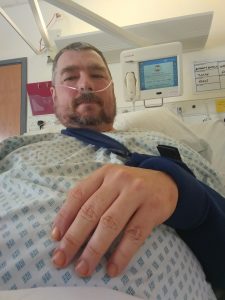
Early start, I don’t look impressed.
This post might jump around a bit, and first off, I wanted to talk about Alan. Alan had done nothing wrong other than fall down some stairs. He’d done nothing wrong other than make it into his 70’s with a mind as sharp as a tack. He deserved respect and dignity, and more than that, he deserved the best standard of care that you can find in the world. What Alan got was a crap shoot where one minute he was being dealt with sensitively by someone who truly cared and the next he was being managed like a problematic child you wish you’d never had. It all depended entirely on which nurse or healthcare assistant he got at the time. We all experienced this in the ward, some of the staff were fantastic, and some were pretty rubbish and ineffective, but in some ways, we were able to fend for ourselves a little more than Alan.
He’d been lying flat for a few days by the time I was admitted, and along with incessant hiccups (which were sadly a source of amusement for most of the staff) he was beginning to get a bit wheezy (day 4). I watched as Alan basically picked up a chest infection in slow motion (day 5). Nurses could tell it was coming. Healthcare assistants commented on it. Yet it felt like the plan was wait until it took hold and then pump Alan full of antibiotics to get rid of it again (day 6). It was like watching paint run down a wall and only when it spilled onto the floor take action mopping it up. Could they have prevented the infection, would antibiotics a day earlier have held off the worst of it? I don’t know, but it was tragic watching it take hold (you’ll see, later).
Alan told everyone who dealt with him that he was deaf in one ear, and hard of hearing in the other. The best of the staff remembered and stood on his good side and spoke loudly and clearly. The worst of the staff ignored his hearing and just talked to him like a child when he failed to hear what they said. I started saying ‘he’s deaf in that ear’ when Alan struggled to hear what they were saying. I was in a bed, on the other side of the ward, and I could hold a fucking conversation with Alan, deaf and hard of hearing, better than some of the staff did while standing next to his head. He wasn’t stupid, he wasn’t tired, he was just hard of hearing. He deserved to be spoken to like an intelligent human being, not like a baby.
There were three shift rotations a day for the nurses and healthcare assistants, and during each rotation the new and old groups would do a round discussing all the patients. That was the handover, and it relied on short conversations, the memories of the people involved, whatever notes had been written into our folders and the words written above our beds on the white boards. It’s always great to be talked about as if you’re not there, I often chipped in during their discussions of me, but not once did any of them say ‘Alan is a bit deaf, stand on his right side’. I watched one set of nurses consult with a doctor when Alan was deteriorating, and they limited his water intake to 1 litre a day. But they didn’t write it clearly above his head, nor did they explain to Alan why. So when the tea lady came around for the rest of that day, she quite happily re-filled Alan’s jug and gave him full cups of tea. Later that day, the nurse complained at Alan about this. It wasn’t fucking Alan’s fault – he’s a patient, he’s not meant to be in charge of his own care. The communication between the staff was just terrible. Eventually one of the nurses told the lady who did the tea about the fluid limit, but the next day, it was a different tea lady … and so Alan got too much fluid again. Eventually, myself and Alan had to keep reminding the people serving him water that he wasn’t allowed it.
Friday morning had arrived, I woke up early having had a pretty fitful night. I’d used up a few more cardboard urine bottles overnight, but the feeling had come back in my lower body and I was able to wiggle the toes in my left foot. While I’d been ignorant of the seriousness of my foot injury, and had been wearing the moon-boot, I’d been able to hobble around quite quickly. Now though I was in a light-weight cast which I wasn’t allowed to bear any weight on, in any way. I couldn’t hop because my left arm was too painful, so I was reduced to pivoting between the bed and the chair next to it if I wanted to move.
Nurses arrived with a fresh gown and a fresh pair of paper pants, along with a bowl of hot water, some more antiseptic scrub and some towels. They left me to get cleaned, saying if I needed help just to buzz with the alarm. That was the most painful washing experience in my life. My left arm was still almost entirely immobile and very swollen. I couldn’t bear even the weight of my own forearm and I couldn’t voluntarily move the arm more than 1cm away from my body. Even getting the gown off was extremely difficult and painful, but I managed. I changed my paper pants, washed as much of my arm as I could in preparation for the surgery and then got the gown back on (but not done up). I buzzed for the nurse, and waited.
And waited.
So I buzzed again.
And waited.
After about 20 minutes and my 6th buzz, the nurse arrived, irritated. Luckily, I hadn’t been choking to death, or hadn’t fallen to the floor, or hadn’t been suffering from any breathing issues or actually anything serious. I was just in pain, unable to get dressed, unable to walk, sitting on a bed waiting for someone to come and help me.
We got the gown tied up and then the nurse tried to put the foam sling back on my arm. She failed, getting the strap in the wrong place, despite me having explained how it needed to go. So I explained again how it needed to go over my shoulder, and she tried again, and failed. Both attempts were excruciating painful. I told her, rather angrily, that I’d sort it out myself thank you very much and she cleared away the water and towels and left me to it. The gent with the motorcycle injury looked over and said, “She’s rubbish”. And she was. I got to know her and her shift quite well over the small number of days I was there, and she was indeed, rubbish. She didn’t communicate, she didn’t listen, she didn’t care and she turned up at her own pace.
I got into trouble once on Facebook when I said something like 20% of people are shit. That includes hospital staff, the police, the army, the clergy, bin men, gravediggers, chefs, teachers, shop keepers, etc. Someone told me that people in the NHS deserve our respect. It’s true, they do. But equally, people are crap. Great people have crap days, and some people are crap all the time. Some people start out great and then get worse over time. Some people are great on day one and great on the day they retire. But the truth is, people are fallible, they have shit days due to regular issues we all suffer. When I have a bad day and go to work, the worst that happens is I write a snotty e-mail and have to apologise for it later. If you work as a nurse and you take your frustrations or stress in to work with you – people can suffer. I wouldn’t ask anyone to do it – I have the utmost respect for anyone that does. There are more good people than bad, more good people in the NHS than bad, but that doesn’t detract from the truth. Some people are rubbish and shouldn’t work in a role which requires them to help people.
This nurse was one of them, or she needed a holiday, or she needed more support from her own management, or something, but whatever the problem was, it impacted my health, and the health of the other people in that ward.
And, she wasn’t even the worst health care professional I was going to experience that day. That was to come much later.
When the nurse with the drug trolley came around that morning, I still wasn’t listed for any drugs, but I explained how much pain I was in and she gave me some codeine after much pleading on my part that paracetamol really wasn’t going to cut it. Then I got a visit from a surgeon. She wasn’t the lead surgeon or consultant doing my shoulder, but she’d come to do the pre-surgery assessment. She asked me how I was feeling, and I was pretty angry at that stage. I explained I was in pain. She asked if I’d been offered any pain relief and I explained I’d pretty much had to beg for codeine. She asked why I hadn’t had any morphine and I told her I hadn’t exactly been given a list of what I was allowed to ask for.
At which point she stood up, and said to the nurse team which were currently doing hand-overs, “Mr Evans doesn’t seem to be happy with his pain relief”. After which, I was fitted pretty quickly for subcut morphine (morphine administered via a subcutaneous line). Hilariously, the dose of morphine I got was delivered to me as I was lying on the bed on my way for a shoulder surgery and a general anaesthetic (GA) but you can’t have everything.
You have to consent to surgery, and they’re very serious about it. Before I got the morphine, we did that little dance with the surgeon explaining the risks and me trying to explain I’d already consented to shoulder surgery on Wednesday during my first appointment with the fracture clinic. But no one could find that paper work so we had to go through it all again. I got a visit from a new anaesthetist, and we discussed options, but given the location of the surgery and the intrusive nature, the only real option was general anaesthetic for this one. Then I was onto the trolley and getting some morphine. I did ask if there was any point and if it would interfere with the GA, but was pretty much dismissed by the nurse administering the dose.
I waved to Alan as I was pushed out of the ward and down to theatre. It was 9:42am and my day had already been a bit challenging.
I texted Greté around 4pm when I woke up, back in the bed. My arm was back in the sling, the only difference being the presence of some pretty big wound dressings. The surgeon I saw that morning would be the last time I spoke to a consultant or surgeon until after I was discharged. At no point did anyone come and tell me if either surgery had gone to plan or had issues, at no point did anyone tell me how to manage either of my injuries. I did, in frustration, explain that to one nurse and the next morning (I told you this would jump around) the on-call doctor came to speak to me, but all she could offer me was “there aren’t any comments on your notes, so I think it all went okay”. Come on NHS, I’m the patient, where’s the communication?
Anyway, I woke up, I was still groggy, Greté and her mum visited me. Over the days I was in, Simes and Sarah visited as well, but I’m ashamed to say I can’t remember on what days they visited. I’m grateful for their visits, but I just can’t piece together when they were! I stumbled through a conversation with Greté but I was clearly still recovering from the GA.
At some point during this day, I had a visit from the clinical pharmacist and we got my medication sorted out. I was prescribed codeine, paracetamol and ibuprofen, and my own diabetic medication was documented so I could use those as necessary. I’d had a couple of visits from the nurse with the drug trolley and one of the questions they and the healthcare assistants ask while doing hourly observations is, are you in pain and can you rate it from 1 to 3. They use 1, 2 and 3 in Derby because they found with 1-10 most people would just pick 1, 5 or 10 anyway. Mostly I responded 1 or 2.
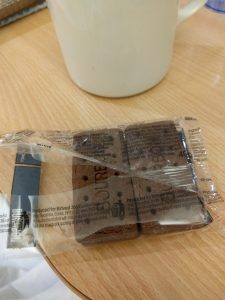
A bourbon biscuit!
Greté left, I had some food and dozed for a bit.
Then around 8 or 9pm Alan started having trouble. He was clearly running a fever and was beginning to get very confused. He hadn’t been diagnosed with his chest infection at this stage, and wasn’t on antibiotics. Twice I watched him try and get out of bed, thinking it was time to go home. It was heart breaking. We’d had the evening nurse shift change and had a male nurse, a female healthcare assistant and another member of staff (not sure if she was a nurse or an HCA). I’d never see any of them before.
Alan was considered a high risk patient. He needed the compression on his feet, and he needed to be turned a couple of times a day and he was on hourly observations. I’d just come out of surgery on GA, and needed hourly observations. I was also in an increasing amount of pain.
Between 8pm and 11pm, I noticed the HCA walk into the ward a few times and stand in the middle, and then look confused and walk back out. She kept looking at a piece of paper in her hand, but would then simply leave the ward. Alan was restless, trying to get out of bed. My pain was increasing but I was still very groggy.
At around 11pm I watched the HCA, and she looked stoned; I’m sure she wasn’t, but she looked it. Maybe stoned, or in shock, or suffering from PTSD, or lost, or she could have been a zombie. Whatever it was, she was clearly out of her depth in a major way. Neither myself nor Alan had had any observations done for over 3 hours, no one had asked me about my pain, Alan had tried to get out of bed twice. He was singing, talking, thrashing and clearly distressed. I was starting to breath heavily to try and deal with the pain in my arm.
The Zombie HCA walked in, looked at her bit of paper, hung around, and then left.
I think I called out saying I needed something for the pain and she mumbled something.
A while later, I was hyper-ventilating and groaning involuntarily.
Alan was singing.
Zombie HCA walked in and straight out.
I started sobbing.
Alan sounded like he was coughing up a lung.
Eventually the male nurse came in. I don’t really remember much about the conversation, but he was irritated at the Zombie HCA, he was irritated at me, he wasn’t happy that I wanted some pain relief, but eventually, after another 50 minutes, he came back with some subcut morphine. I’d been in pain from 8pm, in serious pain from 10pm and in almost unbearable pain from 11pm, but around 12:30am I finally got some pain relief.
I say relief, but by them it was too late. Essentially, whatever they used to block the pain as part of the GA wore off in one go between 10pm and 11pm, so I went from being uncomfortable, to being in all the pain having your arm cut open and metal plates screwed into the bone can induce in the space of 60 minutes. The morphine just took the edge off and made me dozy, it didn’t kill the pain. Not long after this, the HCA spoke to me for the first time all evening, she said, “Can you rate your pain level between 1-3?”. I asked her if she was fucking joking, given she’d just watched me go from normal to sobbing in the space of an hour and beg for morphine, but she didn’t really show any signs of understanding what I was saying. I told the male nurse that “I didn’t trust the other nurses”, and he very angrily pointed out they weren’t nurses, they were healthcare assistants. I guess he was having a bad day.
I dozed in and out of sleep for a while, and when I woke up in pain, I buzzed and got more morphine. That happened another couple of times overnight, each time I’d wake up, buzz, and get more morphine.
Finally the night of the zombie healthcare assistant was over, and day 6 (Saturday) had begun.
Before day 6 however, here’s a section of other stuff that happened on day 5, but which I can’t place in the timeline because it’s all so fuzzy.
- During one of the drug rounds, after my surgery, a nurse pulled out a large needle and said ‘I need to inject this into your stomach’. It was pretty abrupt, and I said, ‘Why?’ She just said, ‘I need to’. So I told her no. I wasn’t prepared to accept some random medication that she couldn’t explain to me. She looked a bit confused but just left. Here’s a top tip, if you want patients to take medication, then you should explain to them what it is. I know that not all people are the same, some don’t care, some don’t understand, but some are intelligent, articulate, interested and aware, and when you have one of those patients you really need to do more than say ‘I am going to stick this in you’. Tune in on day 6 to see if I ever accept my heparin or heparin equivalent.
- Despite not being nil by mouth any more, they left that phrase written on my whiteboard and I had to explain it away every time the tea lady came by.
- While Zombie Healthcare Assistant was failing to do her observations properly (she did eventually take some, but she wrote them up wrongly on the system, mixing up the numbers) both the male nurse and the other female member of staff had conversations with her, explaining she was screwing up and trying to get her to correct the issues. But it didn’t help. I didn’t get any proper observations until the next shift change, and Alan was pretty much ignored all night. I assume the ward was understaffed, and I hope Zombie HCA gets the help she needs in whatever form it takes, but someone needs to manage their staff better.
- There had been a trainee nurse on the ward earlier – she was doing the HCA role. She was the only one who actually wrote everything in the folders, and she was constantly aghast at how little information there was. She took care of Alan before the shift change to Zombie HCA.
- The next day, the regular nurses complained amongst themselves at how much the trainee nurse had done. They were pissed off that she’d done lots of nurse stuff, not just HCA stuff, even though she was supposed to be doing HCA training. I think they were mostly pissed off that she made them look bad. Which of course, they were. I don’t know the relationship between nurses and HCAs or how the training works, or what role everyone was doing. I just know she was a nurse in some capacity, but was only covering, or learning, or supposed to be doing the HCA role in that ward, but because she saw holes in the care of the patients she just covered where she could and I appreciate that.
- Alan finally got some sleep, although he spent much of it mumbling and unhappy.

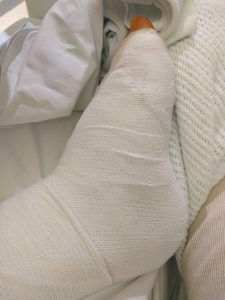
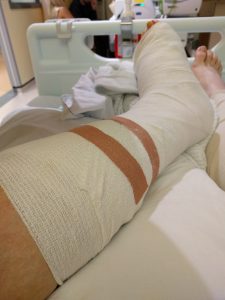
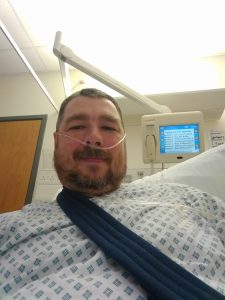
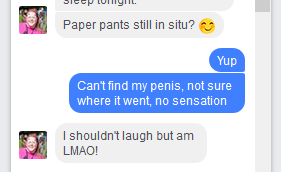

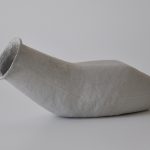 I finished the day off with a massive wee; into two cardboard urine receptacles. I’d taken on board a lot of fluids during the surgery, and despite not having anything to drink since the previous night, I’d also not been to the loo since around 11am, so there was plenty of water to get rid of. When the nurse came to collect the used bottle, I had to let them know they were both full – I don’t think she believed me initially, but she took them both and returned with two empty ones. That would be a pattern for the next day or so, where I think I passed a volume of liquid equal to Loch Ness. I can’t quite describe the subtle terror of lying in a bed, not able to feel your own legs or find your own penis by touch, weeing into a carboard bottle which is resting on the bed, trying to work out if you’re holding it at the right angle so that it doesn’t just spill out of the top.
I finished the day off with a massive wee; into two cardboard urine receptacles. I’d taken on board a lot of fluids during the surgery, and despite not having anything to drink since the previous night, I’d also not been to the loo since around 11am, so there was plenty of water to get rid of. When the nurse came to collect the used bottle, I had to let them know they were both full – I don’t think she believed me initially, but she took them both and returned with two empty ones. That would be a pattern for the next day or so, where I think I passed a volume of liquid equal to Loch Ness. I can’t quite describe the subtle terror of lying in a bed, not able to feel your own legs or find your own penis by touch, weeing into a carboard bottle which is resting on the bed, trying to work out if you’re holding it at the right angle so that it doesn’t just spill out of the top.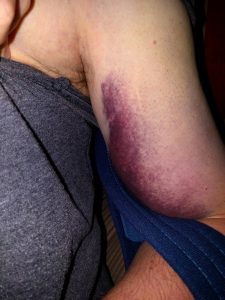
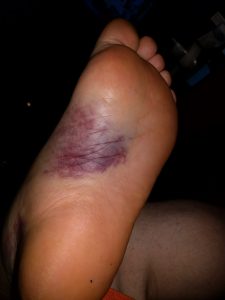
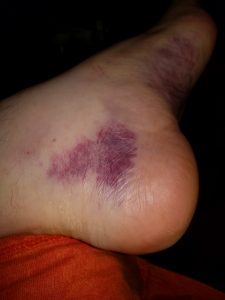
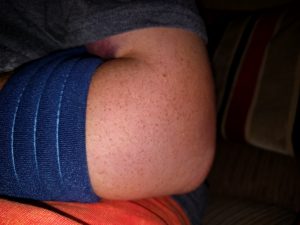
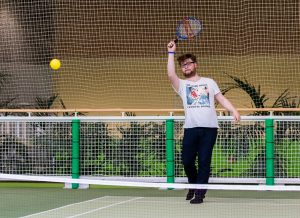
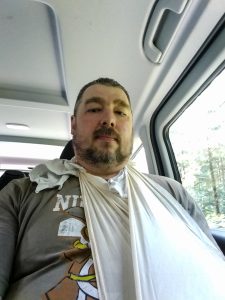
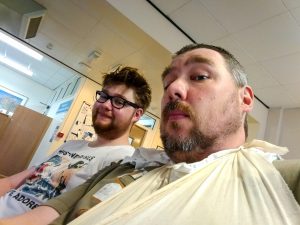
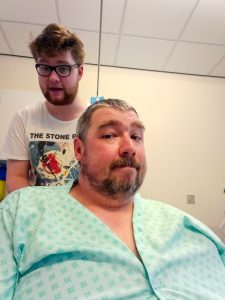
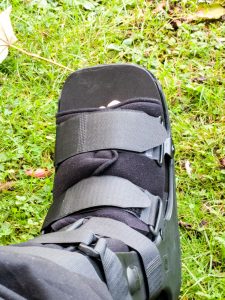
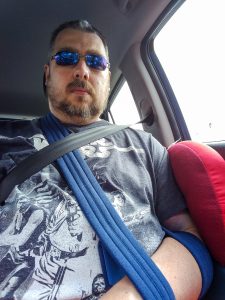
 I was in too much pain for the first few days at home to do anything though – which meant a lot of television. Eventually I decided to stop the brain rot caused by that and whacked Mass Effect 1 into the Xbox One now that it’s playable under the backwards compatibility feature. I completed a full play-through with all the DLC. That led to Mass Effect 2 (360 only, not backwards compatible yet) and some fun and games getting the ME1 saves to import (saved on the Xbox One, but used on the 360). Another full play-through with all DLC. Inevitably, I finished ME3 (and all DLC)! after that as well. It’s not the first time I’ve played them, although I’ve played ME2 most, I’ve completed ME1 and ME3 a couple of times at least. I think that was around 120 hours of gaming.
I was in too much pain for the first few days at home to do anything though – which meant a lot of television. Eventually I decided to stop the brain rot caused by that and whacked Mass Effect 1 into the Xbox One now that it’s playable under the backwards compatibility feature. I completed a full play-through with all the DLC. That led to Mass Effect 2 (360 only, not backwards compatible yet) and some fun and games getting the ME1 saves to import (saved on the Xbox One, but used on the 360). Another full play-through with all DLC. Inevitably, I finished ME3 (and all DLC)! after that as well. It’s not the first time I’ve played them, although I’ve played ME2 most, I’ve completed ME1 and ME3 a couple of times at least. I think that was around 120 hours of gaming. I’ve loved BioWare games for a long time, they’re a part of my gaming history on the PC and consoles. Baldur’s Gate and Neverwinter Nights have special places in my gaming memory. I loved the dialog, I loved the characters and the phrases. Hell, myself, my wife and our gaming friends are still using quotes from the Baldur’s Gate series ((Give a man a fish and he can eat for a day, give him a sword and he can chow down on the marrow of evil!)) , when roleplaying, gaming and sometimes shopping.
I’ve loved BioWare games for a long time, they’re a part of my gaming history on the PC and consoles. Baldur’s Gate and Neverwinter Nights have special places in my gaming memory. I loved the dialog, I loved the characters and the phrases. Hell, myself, my wife and our gaming friends are still using quotes from the Baldur’s Gate series ((Give a man a fish and he can eat for a day, give him a sword and he can chow down on the marrow of evil!)) , when roleplaying, gaming and sometimes shopping.